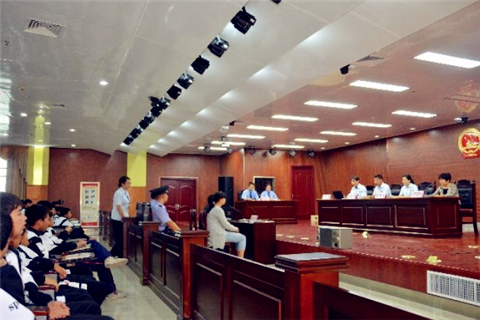Little imps should not be running free in society
- By Xie Caifeng
 0 Comment(s)
0 Comment(s) Print
Print E-mail China Daily, August 30, 2016
E-mail China Daily, August 30, 2016
|
|
|
Students taking part in a moot court in Nanyang, Henan province. [Photo/hncourt.gov.cn] |
Juvenile delinquency has been on the rise in recent years. For instance, last month, a 13-year-old boy in Cenxi, Southwest China's Guangxi Zhuang autonomous region, reportedly killed three boys younger than him in his village. But he escaped criminal punishment because he was below 14 years, the minimum age for criminal prosecution in China. And in June, a 13-year-old boy set his 24 year-old teacher, surnamed Yang, on fire in Jinchuan county of Southwest China's Sichuan province just to rob her of her iPhone. He, too, was released despite Yang suffering severe burns.
Thanks to social progress and the advancement of the internet, many children below 14 years of age are emotionally and intellectually mature and therefore should be held responsible for their actions. This is partly corroborated by the latest Draft of General Principles of Civil Law, which proposes to reduce the age for civil responsibility from the age of 10 to 6.
The minimum age for criminal responsibility in different countries ranges from 6 to 18 years, which means there is room for reducing the age for criminal responsibility in China.
However, some scholars disagree. First, there are no systematic statistics or studies on the crimes or violent actions committed by children below 14. So we cannot conclude that more and more adolescents are committing serious crimes.
Second, many empirical studies overseas show that reducing the age for criminal responsibility creates new problems, such as cross contamination and "labeling".
Third, reducing the age of criminal responsibility would be against the conservative principle of criminal law, which says penal punishment should not be resorted to if alternative measures are available.
Fourth, civil responsibility is different from criminal responsibility, because the former can be transferred or substituted while the latter cannot, and the punishment for a crime is very severe and often comes with a lifelong stigma. Hence, the change in the age for civil liability should not necessarily lead to a change in the age for criminal responsibility.
But despite the focus of juvenile justice on rehabilitation, proper punishment is also necessary. We cannot conclude that the age for criminal responsibility should be reduced to 12, but we could and should improve the existing rules.
In China, if children below 14 commit violent offenses, their parents or custodians are required to pay civil damages. In some cases, the children are sent to a juvenile correction center but more often than not they are sent back home without receiving any punishment. Some of those children even become perpetual offenders because they don't receive appropriate corrective measures after committing the first offence.
According to the theory of criminal law, a person without enough capacity to identify and control his/her actions cannot be held criminally liable. A child below the age for criminal responsibility is presumed to not have the emotional, mental and intellectual capacity to commit a crime. Sticking to a concrete age may be convenient for law enforcement but may lead to unfairness in some cases.
The law should be made flexible on this subject by, say, introducing the principle of malicious intent vis-à-vis age. It means, if a child below the age for criminal responsibility commits an offense with substantive maliciousness, he/she should be treated as a person with full capacity to realize the consequences of his/her actions. Substantive maliciousness can be reflected in a child's intent and action, and the severity of its outcome.
Of course, strengthening penalty is not the panacea for juvenile delinquency. Many studies show poverty, parental divorce and/or domestic violence generally lead juveniles toward violence; over-exposure to violence and sex on the internet, too, could have the same effect. Therefore, teachers and parents must make efforts to provide a healthy environment for children so that they understand social relations and do not commit serious offenses.
The author is a judge at the Shunyi Court in Beijing.






